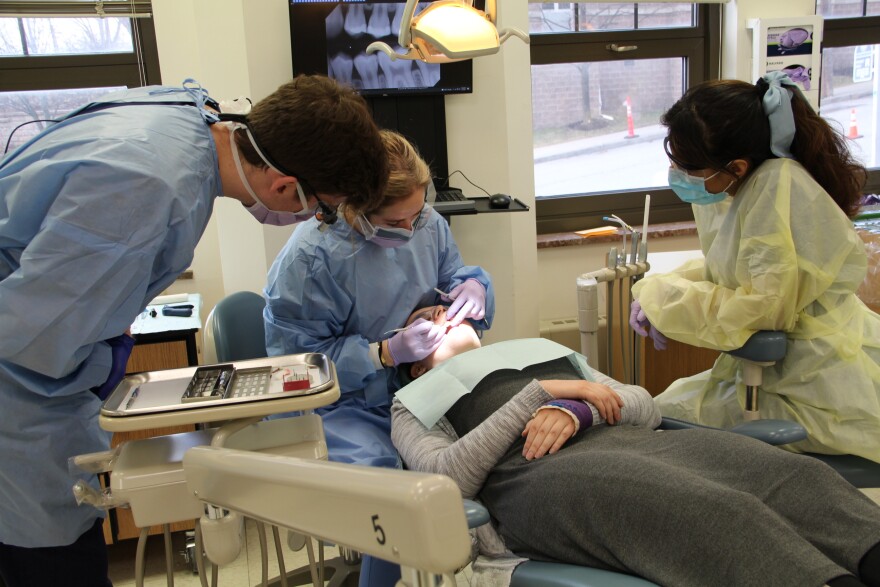In response to a widespread shortage of dental assistants, the University of Pittsburgh is using a nearly $319,000 grant from the state Department of Labor and Industry to launch an apprenticeship program for high school graduates.
While Pitt has a program for dental hygienists, it doesn’t have one to train dental assistants, who dental professionals say are essential to their practices. Multiple professional associations and local practitioners say dental offices are struggling to fill dental assistant positions, and officials at Pitt's School of Dental Medicine say alumni often reach out and ask for help with finding applicants for those jobs.
“I was at a function [recently] and ran into one of our alums, and before he even said hello, he said, ‘I need dental assistants. Can you help me?” said Jim Earle, the school’s executive dean for strategic development and operations.
Some say the shortage has historically been an issue but has been exacerbated by the COVID-19 pandemic. A 2022 American Dental Association survey of 3,000 practices found that 41 percent of respondents were recruiting dental assistants. More than 90 percent of respondents to the survey said it has been “extremely or very challenging” to recruit assistants this year.
At Pitt, the state grant will cover tuition for six students and pay them for 14 months of on-the-job training. By the end of the program, students will be prepared to take a certification exam, for which the university will cover the cost, Earle said.
Earle called dental assistants the “utility player” of a dental office. They’re tasked with sterilizing instruments and prepping rooms for the next patients. They might sit alongside a dentist to assist with procedures, and many are certified to take X-rays.
“They play such a critical role because dentists, especially those in private practice, their livelihood really comes down to productivity and how many patients they can see and the quality of care that they provide,” Earle said.
The apprenticeship was developed with Pittsburgh Public Schools but will be open to any student in the region. Pittsburgh Public Schools did not make anyone available for an interview for this story in response to WESA's request.
Students in the program will work in Pitt’s dental clinics alongside trained dental assistants. They also will also be exposed to specialties such as orthodontics, oral surgery and periodontics.
Earle said while the new program could eventually help to alleviate the shortage, he also hopes that it will diversify the field.
“They get paid while they train, which makes it really accessible to a lot of people,” he said. “In our effort to try to reduce any barriers to joining the program, the apprenticeship solution seemed like the right one.”
Most graduates of Pitt’s dental programs are white, though Earle said this year’s class is the most diverse ever. In this fall’s Doctor of Dental Medicine program, 42 students are white, 17 are Asian, 13 are African American, six are Hispanic, two are American Indian and one is a Pacific Islander. In comparison, the class of 2018 had 54 white students, 21 Asian students, three African American students, one Hispanic student, one American Indian student and no Pacific Islander students.
Because so many dental professionals are white, all students may not see careers in the profession as options for them, Earle said.
Joan Burke, the president of the Pennsylvania Dental Assistant Association, said the dental assistant profession has also been in “a steady decline for many years,” due to lack of recognition and pay, and overwork.
“A good dental assistant is the backbone to a well-run office, and not everyone appreciates their value,” Burke said. “Having assistants licensed or credentialed in some way … makes a job a career. Assistants need to invest in themselves but also have the needed recognition that they are professionals.”
Beth Savinda is an expanded-function dental assistant at Nova Dental’s office in Bloomfield. Her certification enables her to perform additional tasks, such as tooth-filling procedures. She has been a dental assistant for 37 years and has spent the past 19 with Nova.
Savinda said her practice is consistently short-staffed. It recently hired a couple of assistants, but it could use more, she said.
“I think some people were scared away from COVID because we’re [working] right in a mouth. People just don’t want to be that close, I guess,” she said.
Still, she said, the pay for dental assistants is better than ever. She said she hopes that more people will seek out the profession.
“I still, 37 years later, look forward to coming to work. I still love what I do. Every day is different. It's never the same,” she said.
Earle said the Pitt program will put dental assistants in a good position to level up to become hygienists, with better pay and benefits. The average pay for an assistant in Pennsylvania is $19.50 an hour.
Dennis Zabelsky, the president of the Dental Society of Western Pennsylvania, said inadequate insurance reimbursements also contribute to the assistant shortage. He said that insurance reimbursements have not kept pace with rising costs of materials and rent, meaning some offices are unable to increase staff salaries.
In his own small practice, for example, he charges $145 for a tooth extraction, but he said that many insurance companies reimburse only $19 for that procedure. There’s not much that the Dental Society or other associations can do about that other than complain to lawmakers, he said.
Those interested in the Pitt apprenticeship program can apply at the University’s Talent Center.





